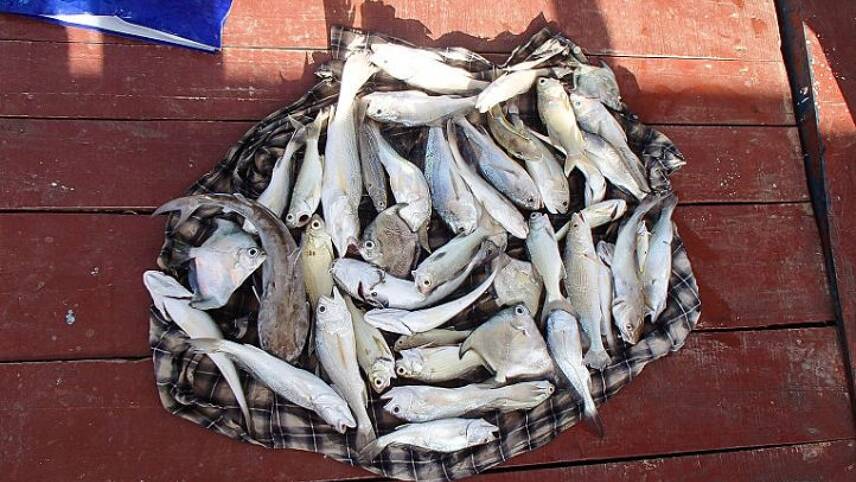Register for free and continue reading
Join our growing army of changemakers and get unlimited access to our premium content

Pictured: Fish caught in The Gambia
Produced by Dutch think-tank the Changing Markets Foundation and published today (15 October), the ‘Fishing for Catastrophe’ report maps the world’s largest fishmeal and fish oil (FMFO) supply chains on a “fishery-to-fork” basis.
Fishmeal is a commercial product made from fish and shellfish which are deemed unfit for human consumption. The majority of industrial fish feeds currently comprise of between 5% and 30% fishmeal – down from 50% in the 1980s – with the product traditionally being used due to its high protein and fat content.
However, according to the Changing Markets Foundation’s findings, most of the FMFO used to feed farmed seafood for British consumers originates in “unsustainable” and often “illegal” fishing operations in India, Vietnam and The Gambia. The report accuses such operations of failing to implement best-practice measures around biodiversity preservation, worker rights and animal welfare.
It additionally claims that the IFFO – the trade body used to certify FMFO as ‘sustainable’ – has accepted membership from companies linked to these fishing operations.
Supermarkets including Tesco, Sainsbury’s, Marks & Spencer, LIDL, ALDI, Asda, Iceland, Morrison’s, Waitrose and The Co-Op sell farmed seafood products fed using IFFO-certified FMFO and, according to the report, “take the body’s assurances about supply chain sustainability at face value”. The most common kinds of farmed seafood on UK supermarket shelves are salmon, prawns and trout.
The report is being supported by presenter and green campaigner Hugh Fearnley-Whittingstall, whose 2011 ‘Fish Fight’ campaign saw the EU introduce legislation banning fishermen from throwing surplus dead fish overboard.
“It’s increasingly clear that even products certified as sustainably produced are based on aquaculture that is sourcing fishmeal in deeply irresponsible ways,” Fearnley-Whittingstall said. “The bottom line is that we need to stop taking wild fish out of the ocean to feed farmed fish, before it’s too late.”
The IFFO’s response to the report can be read in full here.
Industry response
Responding to the report’s accusations on behalf of the supermarkets named, the British Retail Consortium (BRC) said the use of wild-caught raw marine ingredients in fishmeal is “becoming progressively more efficient as novel ingredients are gaining more traction as sustainable additions to the feed basket, which is alleviating pressures on wild fish stocks”.
“This has been supported through utilising greater amounts of fishery and aquaculture processing by-product and increasing amounts of plant-based ingredients,” BRC’s sustainability policy advisor Leah Riley Brown said. “Moreover, most remaining wild-caught fish used in fishmeal and oil would not typically be fished in significant quantities for human consumption and are sustainably and responsibly fished.”
Riley Brown additionally highlighted the progress made by BRC’s supermarket members under its ‘Better Retail, Better World’ campaign, which has committed to supporting efforts to conserve 10% of global coastal and marine areas.
Both Waitrose & Partners and Asda gave edie their own statements regarding the report, in addition to the BRC’s comments.
Asda said it is the only British retailer to openly publish data on its farmed fish supply chains, including FMFO, as recommended in the report.
A Waitrose & Partners spokesperson said it “fully supports” the standards set by the IFFO, including its Responsible Supply certification programme, and that all caught species for the production of FMFO used in its supply chains must also adhere to the requirements of the Waitrose Responsible Seafood Soucing Programme.
The Changing Markets Foundation maintains, however, that the “IFFO is wholly unfit to serve as a certification body because it was set up to defend the interests of the industry it is meant to oversee”.
It is calling for the body to be abolished and for retailers to set their own standards instead and conduct regular supply chain audits. The organisation is also calling on policymakers to implement stricter regulations on due diligence and transparency in aquafeed supply chains, with a particular focus on overfishing and human rights abuses.
“The economics of the FMFO industry are broken; if aquafeed companies do not move faster to source genuinely sustainable alternatives they will face serious economic and reputational consequences that could substantially alter the predicted growth for the industry and those reliant on it”, the Changing Markets Foundation’s campaign manager Natasha Hurley said.
“The question is: what comes first – the collapse of natural ecosystems or the collapse of the economic sector that is responsible for the problem?”
Sarah George


A Practical Solution To Fish Stock Depletion
Fish in the wild are being over exploited, and whole fish species face extinction. But there is an easy way of preventing these extinctions. An international law should be passed which ensures that the gonads of all fish caught are liquidized and put into water containers, the fish are usually gutted anyway so this would not be a great hardship for the fishermen. Once liquidized, artificial fertilization takes place, and after twenty four hours the fertilized fish eggs can be released into the sea. It does not matter where the eggs are put back because the fry of each species find their way back to the environment they originally come from.
In this way, the sea can be repopulated, and fishing can even become sustainable.
The Japanese were the first country to fish in this way, and had their Navy protect the massive shoal until the fish matured. I have only heard of it being done the once, though.
Copyright Kadir-Buxton 2019
Created at Mr Site